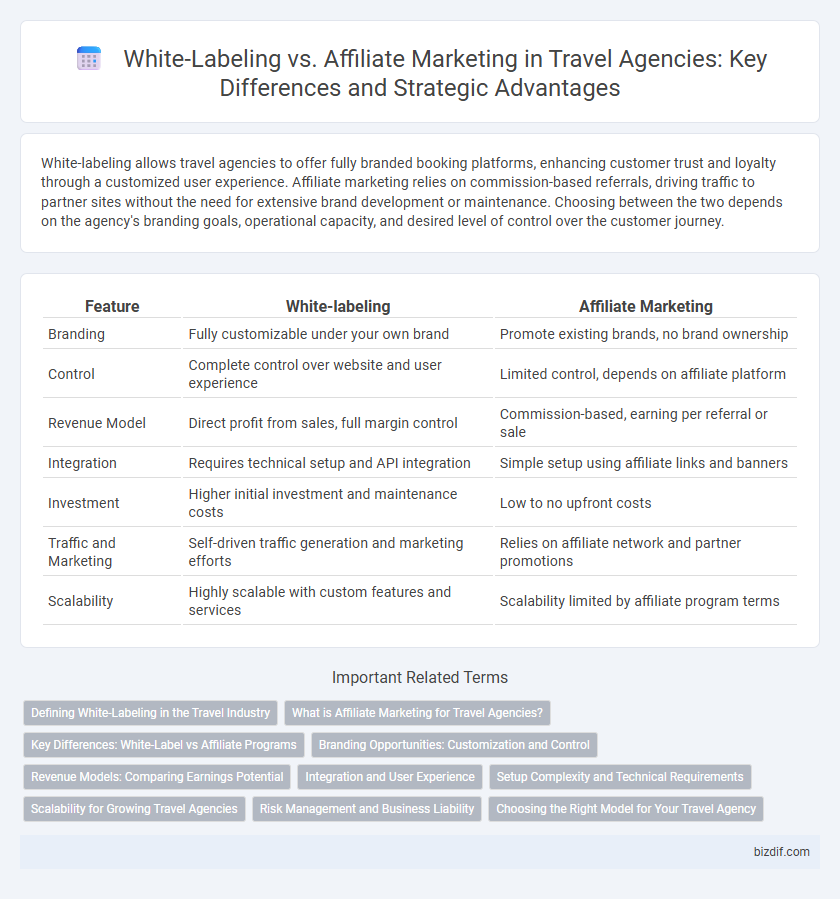White-labeling allows travel agencies to offer fully branded booking platforms, enhancing customer trust and loyalty through a customized user experience. Affiliate marketing relies on commission-based referrals, driving traffic to partner sites without the need for extensive brand development or maintenance. Choosing between the two depends on the agency's branding goals, operational capacity, and desired level of control over the customer journey.
Table of Comparison
| Feature | White-labeling | Affiliate Marketing |
|---|---|---|
| Branding | Fully customizable under your own brand | Promote existing brands, no brand ownership |
| Control | Complete control over website and user experience | Limited control, depends on affiliate platform |
| Revenue Model | Direct profit from sales, full margin control | Commission-based, earning per referral or sale |
| Integration | Requires technical setup and API integration | Simple setup using affiliate links and banners |
| Investment | Higher initial investment and maintenance costs | Low to no upfront costs |
| Traffic and Marketing | Self-driven traffic generation and marketing efforts | Relies on affiliate network and partner promotions |
| Scalability | Highly scalable with custom features and services | Scalability limited by affiliate program terms |
Defining White-Labeling in the Travel Industry
White-labeling in the travel industry involves a company providing fully branded travel products or services that other agencies can market as their own, enabling seamless integration into the reseller's platform. This model allows travel agencies to offer customized booking engines, tours, or accommodation options without developing them from scratch, enhancing brand control and customer loyalty. White-label solutions often include access to supplier inventories, real-time pricing, and customer support managed by the provider, streamlining operations and expanding service offerings.
What is Affiliate Marketing for Travel Agencies?
Affiliate marketing for travel agencies involves partnering with third-party websites or influencers who promote the agency's travel packages and services in exchange for a commission on sales generated through their referral links. This performance-based model increases brand exposure and drives targeted traffic without the agency needing to manage the customer relationship directly. By leveraging affiliates' audiences, travel agencies can efficiently expand their reach and boost bookings with minimal upfront investment.
Key Differences: White-Label vs Affiliate Programs
White-label travel solutions offer agencies full branding control and a seamless customer experience by integrating the provider's platform under their own brand, whereas affiliate marketing programs focus on driving traffic and sales through commission-based referrals without branding customization. White-label programs typically require a higher investment and technical integration but yield greater customer loyalty and data ownership. Affiliate marketing provides a low-cost entry point with performance-based payouts, ideal for agencies seeking flexible, low-risk revenue streams.
Branding Opportunities: Customization and Control
White-labeling offers travel agencies extensive branding opportunities through complete customization of website design, content, and user experience, ensuring consistent brand identity and control over customer interactions. Affiliate marketing provides limited branding control, as agencies promote third-party platforms with preset branding and minimal customization options. Opting for white-label solutions enables agencies to build stronger brand loyalty and differentiate themselves in the competitive travel market.
Revenue Models: Comparing Earnings Potential
White-labeling in the travel agency sector offers higher revenue potential through direct control of pricing and brand identity, enabling customized client experiences and increased profit margins. Affiliate marketing typically relies on commission-based earnings from bookings made via referrals, resulting in lower but more passive income with minimal operational responsibilities. Evaluating these models, white-labeling suits agencies aiming for long-term brand growth and revenue scalability, while affiliate marketing appeals to those seeking low-risk, overhead-free revenue streams.
Integration and User Experience
White-labeling offers seamless integration by allowing travel agencies to fully customize the booking platform under their own brand, enhancing user experience with consistent design and direct control over the interface. Affiliate marketing typically involves redirecting users to third-party websites, which can disrupt the user journey and dilute brand presence. Choosing white-label solutions improves customer retention through streamlined, native booking experiences, whereas affiliate marketing may benefit from lower setup costs but less cohesive user engagement.
Setup Complexity and Technical Requirements
White-labeling in travel agencies demands higher setup complexity and advanced technical infrastructure, including custom website development and integration of booking engines under the agency's brand. Affiliate marketing requires minimal technical setup, typically involving the placement of tracking links or banners on existing platforms. Agencies opting for white-label solutions must invest in regular maintenance and technical support, whereas affiliates rely primarily on third-party systems managed by providers.
Scalability for Growing Travel Agencies
White-labeling offers growing travel agencies scalable solutions by enabling full brand customization and control over customer experience, facilitating seamless integration of booking platforms without building from scratch. Affiliate marketing scales predominantly through commission-based partnerships, allowing agencies to expand reach rapidly with minimal upfront investment but often limits brand differentiation. Strategic use of white-labeling supports long-term growth with proprietary assets, while affiliate marketing accelerates market penetration through network leverage.
Risk Management and Business Liability
White-labeling in the travel agency sector involves greater business liability as agencies rebrand and sell products under their name, requiring rigorous risk management to ensure compliance with legal and safety standards. Affiliate marketing poses lower risk since agencies primarily earn commissions by promoting third-party services without handling customer transactions or assuming direct responsibility. Effective risk management strategies must consider the extent of control and liability each model entails to safeguard the agency from potential legal and operational risks.
Choosing the Right Model for Your Travel Agency
White-labeling offers travel agencies a fully branded platform with complete control over customer experience and pricing, ideal for those seeking strong brand identity and higher profit margins. Affiliate marketing provides a low-risk, commission-based model that requires minimal upfront investment, suitable for agencies looking to quickly generate revenue without managing the booking infrastructure. Assessing factors like budget, brand strategy, operational capacity, and desired customer control helps in selecting the optimal model that aligns with long-term business goals.
White-labeling vs Affiliate marketing Infographic

 bizdif.com
bizdif.com